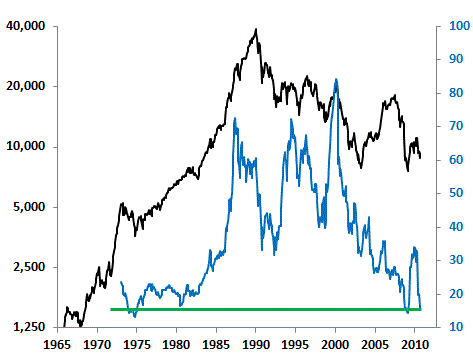| Home | About Us | Resources | Archive | Free Reports | Market Window |
And the World's Cheapest Stock Market Is...By
Tuesday, October 26, 2010
The world's cheapest major stock market is... Japan.
"It's hard for investors to buy stocks," Tomochika Kitaoka, a senior strategist at Tokyo's Mizuho Securities, told Bloomberg yesterday.
But why?
"The Japanese yen is too strong," Yoshinori Nagano said in the same article. Nagano is a senior strategist in Tokyo at Daiwa Asset Management, which oversees about $104 billion.
The yen just strengthened to a 15-year high. Nagano explained, "The current dollar-yen rate isn't at a level that reflects economic fundamentals."
When the yen soars, Japanese companies like Toyota suffer. But when the yen starts to fall, Toyota's profits can soar.
You see, over 70% of Toyota's sales are from overseas. When the yen gets stronger, Toyota's profit margins shrink. It makes a sale in weak dollars, but its costs are in strong Japanese yen.
In part because of the strong yen hurting companies like Toyota, Japan's Nikkei 225 Index is the worst-performing index this year among the world's 40 largest stock markets.
This has made stocks in Japan ridiculously cheap...
With the exception of the late 2008/early 2009 stock market bust, Japanese stocks are cheaper than they've ever been on a price-to-book basis, going back decades. (Japanese stocks trade at just a bit over book value, while U.S. stocks trade at about two times book value.)
Except for the late 2008/early 2009 bust, you have to go back to 1974 and 1980 to find Japanese stocks this cheap on a price-to-earnings basis. The chart here tells the story...
The price-to-earnings ratio is in blue, and the Nikkei 225 Index is in black.
 As you can see, stock prices in Japan soared in the 1980s to over 60 times earnings – ridiculously overpriced. In the 20 years since the stock market peak, the Nikkei index has lost over three-quarters of its value, from a peak near 40,000 to below 10,000 today. Now, Japan trades at a forward price-to-earnings ratio in the teens.
It is the perfect setup for an investment...
Shares are the cheapest they've been in three decades (except for the recent Great Recession). Yet investors are scared to buy Japanese companies... mostly because of the expensive yen.
Meanwhile, in U.S. dollar terms, Japanese stocks have been on a quiet uptrend (as measured by the iShares Japan fund, symbol EWJ).
If you're a longtime DailyWealth reader, you know I look for three factors in an opportunity: cheap, hated, and in an uptrend. Japan meets those criteria as well as any market in the world. It is record cheap. It is totally ignored. And yet there's a quiet uptrend.
Any relief in the value of the yen could send shares of companies like Toyota rocketing higher. So we've got a nice setup, when you size up the risk versus the reward...
You could set a stop loss at 9,000 on the Nikkei, which is just four percent away. So your downside is roughly 4%. But your upside could be as much as 10 times that (a 40% run).
I have a rough rule of thumb of having three times the upside potential as I have downside risk. In this case, our odds are much better.
If you're looking for a low-risk speculation with significant upside potential, consider Japan... the world's cheapest stock market.
The simplest way to get exposure to Japan is through the iShares Japan Fund (EWJ).
Good investing,
Further Reading:
According to Steve, there is no greater investment value in the world than small Japanese stocks. "For me," he says, "buying small Japanese companies today is like buying gold in 2002. If you missed gold then, don't miss this now..." Get the full story here: Buying the World's Cheapest Stock Market.
Market NotesA HUGE, PROFITABLE, AND BORING UPTREND The market likes one of the most "boring" ideas we've talked about all month... just check out shares of Yanzhou for proof.
In late September, Steve noted how coal and steel stocks are two of the world's biggest "boom and bust" assets. While owning coal and steel stocks sounds boring to most people, these China-sensitive assets regularly soar... and crash. Traders can catch these moves for giant capital gains...
As you can see from today's chart, the move to catch right now is to the upside. The chart displays the past two years of trading in Yanzhou Coal, one of China's largest coal producers. The stock has doubled in the past year... and just yesterday, popped 9% higher on great earnings to reach an all-time high.
These earnings come from one of the biggest investment trends of our generation: The growing energy consumption of China, India, and the rest of Asia. In a recent "must read" piece, our colleagues Porter Stansberry and Braden Copeland showed how the big trend in coal is a great way to hedge yourself against a Federal Reserve-sponsored inflation disaster. Make sure you're familiar with it...
|
In The Daily Crux
Recent Articles
|

